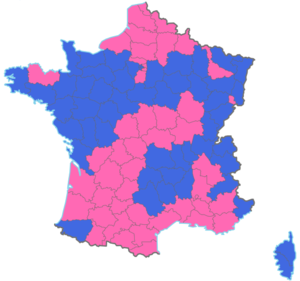- French presidential election, 1974
Infobox Election
election_name = French presidential election, 1974
country = France
type = presidential
ongoing = no
previous_election = French presidential election, 1969
previous_year = 1969
next_election = French presidential election, 1981
next_year = 1981
election_date = 5 May and 19 May 1974
candidate2 =François Mitterrand
party2 = Socialist Party (France)
popular_vote2 = 12,971,604
percentage2 = 49.19%
candidate1 =Valéry Giscard d'Estaing
party1 = Independent Republicans
popular_vote1 = 13,396,203
percentage1 = 50.81%
map_size = 250px
map_caption = Results of the second round: the candidate with the plurality of votes in each administrative division. Valéry Giscard d'Estaing: blue; François Mitterrand: pinktitle = President
before_election =Georges Pompidou
before_party = Union of Democrats for the Republic
after_election =Valéry Giscard d'Estaing
after_party = Independent RepublicansPresidential elections were held in
France in 1974, following the death of PresidentGeorges Pompidou . They went to a second round, and were won byValéry Giscard d'Estaing by a margin of 1.6%.Campaign
In 1969,
Georges Pompidou , formerly Prime Minister under the presidency of GeneralDe Gaulle , was electedPresident of France for a seven year term. However, he died in office on 2 April 1974, and the French voters were called to elect his successor. The political classes were caught unawares by Pompidou's death.On the Left, the Socialist Party (PS), the
French Communist Party (PCF), and the Movement of Left Radicals (MRG) campaigned for the "Common Program" that they agreed in 1972. Whilst the PCF was the main force of this coalition (at least in terms of popular support), they united behind the candidacy of the PS leaderFrançois Mitterrand . Indeed, they thought the "Union of Left" could not win if it was led by a Communist in the presidential race. The fear of communism was often an argument used by the French Right to win elections. Furthermore, Mitterrand had succeeded in forcing an unexpected second ballot when he was candidate in 1965 against General De Gaulle. Only two smaller Trotskyist parties refused to support Mitterrand and the "Common Program", as well as the Social Democratic Party founded by a split of Socialist elects who disapproved the alliance with the PCF. For the fist time since the beginning of theFifth Republic in 1958, the Left had a serious chance of victory.The situation in the "Presidential Majority" was very confused: no "natural candidate" had appeared. Prime Minister
Pierre Messmer had announced he would run if he was the only candidate of the majority. This condition being not satisfied, he withdrew. Four men declared their will to run: formerGaullist Prime MinisterJacques Chaban-Delmas , the Chairman of the National AssemblyEdgar Faure , the former Craftsmen and Shopkeepers Minister representing the ultra-conservative wing of theGaullist Party Jean Royer , and finally the Economy Minister and leader of theIndependent Republicans Valéry Giscard d'Estaing . Quickly, Faure withdrew and the real competition on the Right was between Chaban-Delmas and Giscard d'Estaing.Chaban-Delmas conveyed an image of being a reformist Gaullist and invoked his proposals for a "New Society", which he had tried to apply when he led the cabinet (from 1969 to 1972), but he was supported by the "Barons of Gaullism" who held the bulk of ministerial offices for 16 years. His challengers denounced the continuation of the UDR-state, that is to say the appropriation of the state by the Gaullist Party.
Giscard d'Estaing portrayed himself as "the change in the continuity", a "modern turn" for the French politics, in the incumbent majority and more reassuring for moderate voters than the "Common Program" which was characterised as a
collectivist project. He benefited from the divisions in the UDR. Indeed, 43 Gaullist personalities close to Pompidou and led by the young Interior MinisterJacques Chirac published an appeal insinuating that Giscard d'Estaing was more likely than Chaban-Delmas to defeat Mitterrand. As a result, the left-wing candidate faced the leader of the Independent Republicans in a very competitive run-off.For the first time in the history of the French presidential elections, a Radio-TV-debate between the two finalists was organized. Mitterrand presented his competitor as the representing of the elites who pursued unfair policies, while Giscard d'Estaing criticized his opponent to be "a man of the past". The turnout reached a record and Giscard d'Estaing was elected with a margin of only 424 599 votes. He nominated Chirac as Prime Minister.
Result
First round
econd round
External links
[http://www.ina.fr/archivespourtous/index.php?vue=notice&from=fulltext&full=d%E9bat+giscard+mitterrand&num_notice=1&total_notices=67] : Radio-TV debate Valéry Giscard d'Estaing/François Mitterrand
Wikimedia Foundation. 2010.

